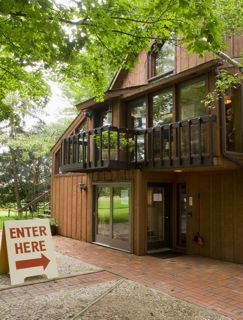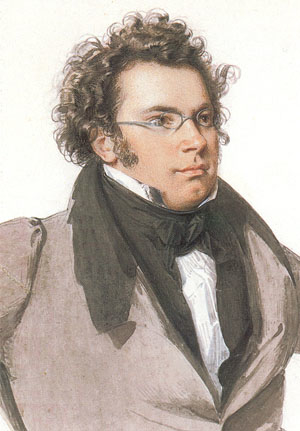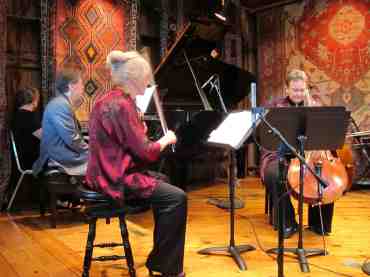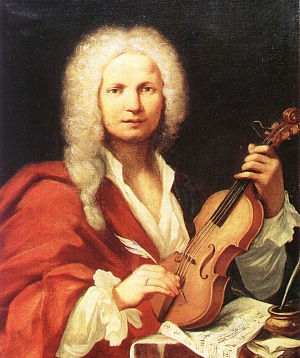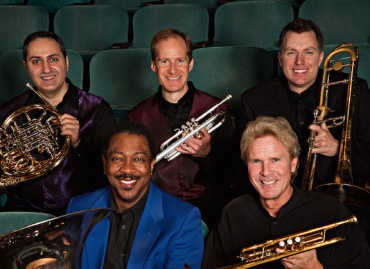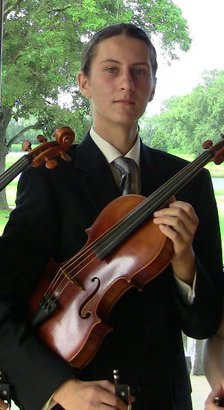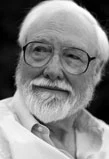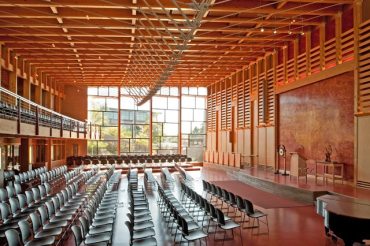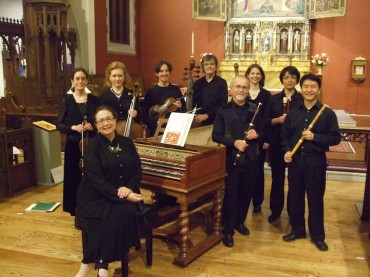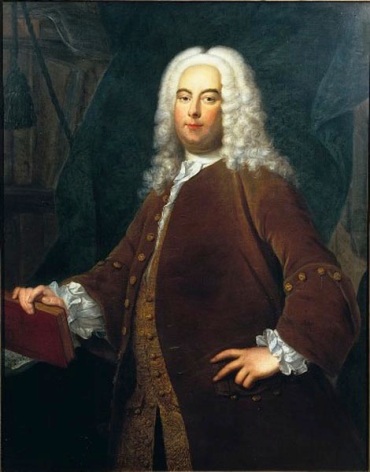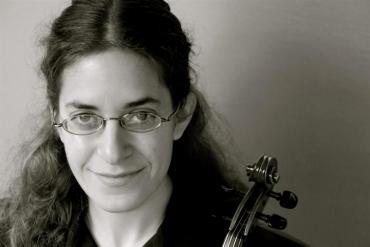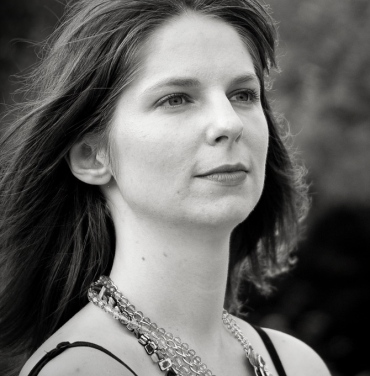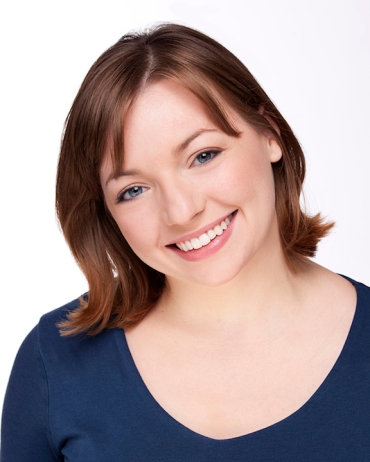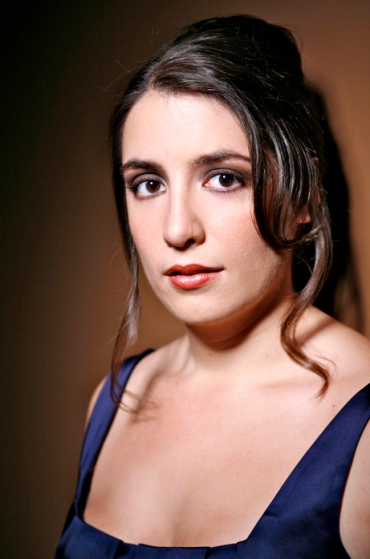The Well-Tempered Ear
Classical music: This year’s Token Creek Chamber Music Festival celebrates local ecological restoration with “water music”
3 Comments
By Jacob Stockinger
Here is an overview of the upcoming 27th Token Creek Chamber Music Festival, which starts this Saturday, Aug. 27, and runs through Sunday, Sept. 4.
TOKEN CREEK, WIS. – Years in the planning, summer 2016 marks the completion of a major ecological restoration project on the Token Creek Festival property in the northeast corner of Dane County, part of the watersheds vital to the hydrology of Madison and southeastern Wisconsin.
During the 1930s, one of the most important feeder streams in the area, and its only cold-water trout stream, was ruined when it was widened to support short-lived commercial interests and development. Now, decades later, in a monumental effort, that stream has at long last been relocated, restored and rescued.
Festival-goers will be able to experience the project firsthand on the opening weekend, when each concert is preceded by an optional stroll along the new stream, with conversation guided by restoration ecologists and project managers.
Celebrating this monumental ecological project, the season theme of this year’s Token Creek Chamber Music Festival is: Water Music. Virtually all of the works programmed evoke brooks and streams and rivers and water in its many forms, with its ritual meanings, associations, allusions, and as metaphor.
In keeping with the theme, the Festival has adopted Franz Schubert (below) as the summer’s featured composer. His poetic, melancholic, ultimately organic and inevitable relationship to the natural world was expressed in composition after composition, wedded to his intense involvement with the poetry of his era, itself so infatuated with birds, fields, clouds and streams.
The second program emphasis continues the festival’s most persistent theme: the music of Johann Sebastian Bach.
Three strands of Bach’s music previously explored at Token Creek will be taken up again. We will present our third complete cantata performance, O heiliges Geist und Wasserbad, a mysterious and poetic piece from early in the composer’s career, with soloists from the Madison Choral Project (below).
We will conclude our survey of the three Bach violin concertos, this year the E major, co-artistic director Rose Mary Harbison (below top) again as soloist. And we take up our sequence of fugues from The Art of Fugue, co-artistic director and composer John Harbison (below bottom), who has won the Pulitzer Prize and a MacArthur “genius grant,” adding three more to his personal odyssey with this work, due to conclude in 2030.
NEW ARTISTS
Token Creek is pleased to introduce several new artists this season, including Grammy Award-nominated mezzo-soprano Margaret Lattimore, who has been praised for her “glorious instrument” and dubbed an “undisputed star…who has it all – looks, intelligence, musicianship, personality, technique, and a voice of bewitching amber color.”
Ms. Lattimore will offer works of Franz Schubert and John Harbison on the Festival’s opening concerts, By the Brook (August 27 and 28), where she will be joined by pianist Molly Morkoski.
Ms. Morkoski (below), who last appeared at Token Creek in 2013, consistently garners praise for her refined virtuosity and “the bold confidence and interactive grace one wants in a devoted chamber music maker.” In addition to the opening program, Morkoski will also be heard on the season finale in Schubert’s “Trout” Quintet (Sept. 2 and 4).
On that same concert, tenor William Hite and pianist Kayo Iwama join forces in Schubert’s devastating and tragic song cycle, Die Schöne Müllerin (The Beautiful Miller’s Daughter), in which a brook functions prominently as the protagonist’s confidante. (You can hear the legendary baritone Dietrich Fischer-Dieskau sing “The Miller and the Brook” from the flowing song cycle in the YouTube video at the bottom.)
New York Times critic Anthony Tommasini has called Hite (below) a “breathtaking communicator of spoken nuance” for his ability to reveal the meaning and emotion embodied in the text and the music, solidifying his reputation as an engaging and expressive artist.
http://www.williamhitetenor.com/
Kayo Iwama (below) is associate director of the Bard College Conservatory of Music graduate vocal arts program, the master’s degree program for classical singers, and she also coordinates the vocal studies program at the Tanglewood Music Center. Her frequent concert partners include Dawn Upshaw and Lucy Shelton.
http://www.bard.edu/academics/faculty/details/?action=details&id=1838
VIOLS AND WILLIAM WARTMANN
Finally, the “technically faultless and consistently sensitive and expressive,” consort of viols, Second City Musick (below), based in Chicago, will offer a guest recital on Tuesday, Aug. 30, anchored by John Harbison’s The Cross of Snow.
Commissioned by local businessman and philanthropist William John Wartmann (below) in memory of his wife, mezzo-soprano Joyce Wartmann, this evocative new piece, on texts of Henry Wadsworth Longfellow, blends the ethereal lushness of violas da gamba with the haunting clarity of the countertenor voice, here Nathan Medley (below bottom), to explore the emotions of grief, loss and love.
At its first performance in Chicago last May, a local critic praised both the work and the musicians: “The Chicago-based ensemble was ideally suited to premiere this profoundly affecting work, and the shared sensibility between composer and performers was noticeable.”
Tuesday’s program will also include works of Henry Purcell, William Byrd, John Jenkins and Johann Sebastian Bach.
Other festival artists this season include vocalists Rachel Warricke, Sarah Leuwerke, Daniel O’Dea, and Nathan Krueger; violinists Rose Mary Harbison, Laura Burns, and Isabella Lippi; Jen Paulson, viola; Karl Lavine, cello; Ross Gilliland, bass; Linda Kimball, horn; and John Harbison, piano.
HERE ARE FESTIVAL PROGRAMS AT A GLANCE:
Program 1: By the Brook – Schubert, Bach and Harbison
Saturday, Aug. 27: 6:45 p.m. – optional guided stream stroll*; 8 p.m. – concert
Sunday, Aug. 28: 2:45 p.m. – optional guided stream stroll*; 4 p.m. – concert
*(The stream stroll is free, but reservations are recommended)
Program 2: Music for Viols, Then & Now
Tuesday, Aug. 30, at 7:30 p.m.
Program 3: Water Colors = Two Schubert Masterworks
Friday, Sept. 2 at 7:30 p.m.
Sunday, Sept. 4 at 4 p.m.
Concert tickets are $32 (students $12). The preview stream stroll on opening weekend is free to concertgoers, but advance reservations are recommended.
Reservations can be made in several ways:
- Online: https://www.eventbrite.com/e/token-creek-chamber-music-festival-2016-tickets-26070692142
- Website (printable order form): www.tokencreekfestival.org
- Phone: 608-241-2525 (voicemail only, please leave a message)
- Email: info@tokencreekfestival.org
- U.S. mail: P.O. Box 5201, Madison WI, 53705
Performances take place at the Festival Barn, on Highway 19 near the hamlet of Token Creek (10 minutes north of Madison) with ample parking available. The venue, indoors and air-conditioned, is invitingly small—early reservations are recommended.
More information about the Token Creek Festival and all events and artists can be found at the website, www.tokencreekfestival.org or by calling 608 241-2525.
Tags: accompaniment, accompany, allusion, Art of Fugue, Arts, association, Bach, Bard College, baritone, Baroque, bass, birds, Byrd, Cantata, Cello, Chamber music, Chicago, choral music, Classical music, clouds, commission, composer, concerto, countertenor, Dane County, Dawn Upshaw, development, Dietrich Fischer-Dieskau, Early music, ecology, fields, Franz Schubert, fugue, genius grant, Grammy, grief, Henry Wadsworth Longfellow, Horn, Jacob Stockinger, Jenkins, Johann Sebastian Bach, John Harbison, John Jenkins, Kayo Iwama, lieder, loss, Love, Lucy Shelton, MacArthur Fellow, Madison, Madison Choral Project, Margaret Lattimore, metaphor, Mezzo-soprano, Molly Morkoski, Music, natural world, nature, New York Times, organic, Piano, poetic, Poetry, premiere, Pulitzer Prize, Purcell, restoration, Rose Mary Harbison, Second City Musick, sing, singer, solo, Sonata, song, song cycle, stream, streams, Tanglewood Festival, tenor, Token Creek Chamber Music Festival, Trout, Trout Quintet, United States, University of Wisconsin-Madison School of Music, University of Wisconsin–Madison, Viol, Viola, Violin, vocal music, vocalist, water, Water Music, watershed, William Hite, William Wattmann, Wisconsin, YouTube
Classical music: Madison Symphony Orchestra holds a FREE Farmers’ Market organ and piano concert this Saturday at 11 a.m.
Leave a Comment
By Jacob Stockinger
The Art Fair on the Square, the annual summer fundraiser held by the Madison Museum of Contemporary Art, will displace the usual Dane County Farmers’ Market this Saturday morning around the Capitol Square downtown,
But the second of this summer’s three monthly FREE Farmers’ Market organ concerts, sponsored by the Madison Symphony Orchestra, will take place this Saturday at 11a.m. in Overture Hall of the Overture Center for the Arts.
The MSO invites families and friends for a relaxing 45-minute concert.
No tickets or reservations are needed and all ages are welcome.
The concert features music for piano and organ and is billed as: “The Über Steinway Meets the Colossal Klais II” with pianist Stephen Nielson (below left) and organist Samuel Hutchison (below right).
The program includes: A Mighty Fortress is Our God, arr. Nielson and Young; Water Music Suite by George Frideric Handel; Hungarian Etude, Op. 39, by Edward MacDowell; Jesu, Joy of Man’s Desiring from Cantata No. 147 by Johann Sebastian Bach, arr. Myra Hess; O Polichinelle from Prole do Bebe by Heitor Villa-Lobos; Simple Gifts, arr. Charles Callahan; Fugue in D Major, BWV 532, by Johann Sebastian Bach (heard in the YouTube video at the bottom); When I Survey the Wondrous Cross, arr. Nielson & Young; Come, Thou Fount of Every Blessing, arr. Nielson and Young
Support for all Overture Concert Organ programs is provided by the Diane Endres Ballweg Fund.
ABOUT THE ARTISTS:
American pianist Stephen Nielson made his orchestral debut as a pianist at age 11. During a 30-year collaboration with his late colleague, Ovid Young, Nielson performed more than 3,500 concerts world-wide as part of the distinguished piano duo Nielson & Young.
Since 2001, Samuel Hutchison has served as Curator and Principal Organist for Madison Symphony Orchestra’s Overture Concert Organ. As an organ soloist, Hutchison has presented many recitals both in the United States and in Europe
For more information about the event and the performers, visit: http://www.madisonsymphony.org/farmer
Tags: A Mighty Fortress Is Our God, Art, Art Fair on the Square, Arts, Bach, Baroque, Cantata, Capitol Square, Chamber music, Classical music, Dane County Farmers' Market, Edward MacDowell, etude, Europe, George Frideric Handel, Heitor Villa-Lobos, hymn, Jacob Stockinger, Jesu Joy of Man's Desiring, Johann Sebastian Bach, Klais Orgelbau, Madison, Madison Museum of Contemporary Art, Madison Symphony Orchestra, Martin Luther, MMOCA, Music, Orchestra, organ, Overture Center, Piano, Simple Gifts, Steinway, Suite, United States, University of Wisconsin-Madison School of Music, University of Wisconsin–Madison, Water Music, Wisconsin, YouTube
Classical music: The Ear needs your help. Rank major Baroque composers Bach, Handel, Telemann and Vivaldi in terms of enjoyability and quality.
23 Comments
By Jacob Stockinger
Uh-oh.
Last week, The Ear struck a nerve.
He commented that he sometimes wished that the Baroque composer Georg Philipp Telemann (below) – the most prolific composer ever of classical music – had composed less because he might have composed even more compelling music.
Here is a link to that post, which also featured Telemann’s lovely Concerto for Viola in G Major, which The Ear finds quite beautiful and engaging.
Of course what I said was considered heresy by some. I heard some pretty strong rebukes from devout Telemann fans and -– no surprise -– a Telemann scholar.
It’s not that The Ear doesn’t listen to music by Telemann or like many of his works. (One such work is Telemann’s own “Water Music,” which stands comparison to Handel’s “Water Music” and which you can hear in a YouTube video at the bottom.)
But he has to be honest: Telemann is just not tops on his playlist.
Consider the Big Four of Baroque composers (in alphabetical order):
Georg Philipp Telemann
and Antonio Vivaldi
When The Ear looks over his CD collection and reviews his listening habits, he finds that what he most often listens to and what he likes best, falls in to the follow ranking: 1. Bach, 2. Vivaldi, 3. Handel and 4. Telemann.
True, Handel would probably rank a spot higher if The Ear really listened to his operas. But even Bach turned to Vivaldi for insights into composing.
So here is what The Ear wants to know:
When you listen to the four Baroque composers, what is the ranking of the four for frequency of listening and enjoyability?
And how do you rank them in terms of quality?
Granted, this business of ranking artists is something of a parlor game. And the results will hardly be definitive in proving anything.
But just maybe others will see that The Ear is not alone in his opinion about the comparative virtues of Telemann, who is certainly a major composer.
So leave your views and ranking in the COMMENTS section.
The Ear wants to hear!
Tags: Antonio Vivaldi, Arts, Bach, Baroque, Chamber music, choral music, Classical music, Compact Disc, concerto, Early music, Georg Philipp Telemann, George Frideric Handel, Jacob Stockinger, Johann Sebastian Bach, Madison, Music, opera, Orchestra, United States, University of Wisconsin-Madison School of Music, University of Wisconsin–Madison, Viola, Violin, vocal music, Water Music, YouTube
Classical music: Virtuoso trumpeter and Empire Brass founder Rolf Smedvig dies suddenly at 62. The Empire Brass plays with the Overture Center Concert Organ on Tuesday, May 12.
1 Comment
By Jacob Stockinger
Rolf Smedvig, the Norwegian-Icelandic trumpeter extraordinaire, died suddenly this past week at age 62, apparently of a heart attack.
Once the young principal trumpet of the Boston Symphony and renowned soloist, he also cofounded and played with the Empire Brass.
Passing along the news seems especially timely and appropriate since the Empire Brass will perform in Overture Hall at 7:30 p.m. on Tuesday, May 12.
Tickets are $20. Call the Overture Center box office at (608) 258-4141.
The brass ensemble will perform with organist Douglas Major (below top), former organist at the National Cathedral in Washington, D.C., at the console of the Overture Center Concert Organ (below bottom).
The program is a delightfully and largely Baroque one, which should highlight the brass sound. It features music by Johann Sebastian Bach, George Frideric Handel, Tomaso Albinoni, Georg Philipp Telemann, Johann Pachelbel and Dietrich Buxtehude and Henry Purcell. (You can hear the Empire Brass, with Rolf Smedvig, performing Handel’s “Water Music” in a YouTube video at the bottom.)
But one wonders: Is there a substitute for Rolf Smedvig? Or has the brass group changed its membership since the publicity photo? It sounds like the latter is the case, but The Ear doesn’t know for sure. Do you?
Here is a link for more information about the Madison concert:
http://www.madisonsymphony.org/empire
Here is a link to a terrific obituary and feature profile done by Tm Huizenga for the Deceptive Cadence blog on National Public Radio (NPR).
Tags: Arts, Bach, Baroque, Boston Symphony, brass, Brass quintet, Chamber music, Classical music, Dietrich Buxtehude, Douglas Major, Early music, Empire Brass, Georg Philipp Telemann, George Frideric Handel, Handel, Henry Purcell, Iceland, Jacob Stockinger, Johann Pachelbel, Johann Sebastian Bach, Madison, Madison Symphony Orchestra, Music, National Cathedral, National Public Radio, Norway, NPR, organ, Overture Center, Overture Concert Organ, Rolf Smedvig, Tomaso Albinoni, University of Wisconsin-Madison School of Music, University of Wisconsin–Madison, Water Music, Wisconsin, YouTube
Classical music: The early music group Ensemble Musical Offering of Milwaukee will make its Madison debut this Sunday in an all-Handel program. Plus, the Madison Symphony Orchestra’s FREE “Final Forte” concerto competition is tonight at 7 on Wisconsin Public Television and Wisconsin Public Radio, and University of Wisconsin-Madison violist Mikko Utevsky performs a FREE recital Thursday night at Capitol Lakes.
3 Comments
ALERTS: Our good friend and frequent contributor Mikko Utevsky writes: Dear Friends, I am giving a viola recital this Thursday, March 27, at 7:30 p.m. in the Grand Hall of the Capitol Lakes Retirement Community (333 West Main Street, near the Capitol Square). The program includes works by Franz Joseph Haydn, Ernest Bloch (the Suite Hebraïque), and viola sonatas of Johannes Brahms (Op. 120, No. 2) and Darius Milhaud (No. 1). I will be joined by pianists Jeff Gibbens and Adam Kluck. I hope the short notice will not prevent some of you from joining me there. Best, Mikko
Also, The Madison Symphony Orchestra‘s “Final Forte” young artist competition will be broadcast LIVE tonight at 7 p.m. on Wisconsin Public Television and Wisconsin Public Radio.
For more details, here is a link to a previous post:
By Jacob Stockinger
Here is a special posting, a review written by frequent guest critic and writer for this blog, John W. Barker. Barker (below) is an emeritus professor of Medieval history at the University of Wisconsin-Madison. He also is a well-known classical music critic who writes for Isthmus and the American Record Guide, and who hosts an early music show every other Sunday morning on WORT-FM 89.9 FM. He serves on the Board of Advisors for the Madison Early Music Festival and frequently gives pre-concert lectures in Madison.
By John W. Barker
Here’s a Handelian heads-up, and with a Madison accent!
The Milwaukee-based Ensemble Musical Offering is to make its first appearance in Madison on this Sunday afternoon, March 30, at 2 p.m., at the First Unitarian Society of Madison’s new and crisply designed Atrium auditorium (below, in a photo by Zane Williams) at 900 University Bay Drive.
Tickets are $15, payable at the door, and available in advance from www.ensemblemusicaloffering.org or by calling (414) 258-6133.
The group, whose supplemental title is the Midwest Bande for Early Music, was founded in 2000 by harpsichordist and director Joan Parsley. As she herself defines the ensemble: “Its mission is to foster appreciation for early music, circa 1580-1750, through professional performance on period instruments, educational activities, and community outreach.”
Winner of several grants, the ensemble not only performs regularly in its home city, but supports the Greater Milwaukee Baroque Festival, which is a competition for students of string and keyboard instruments, plus a one-week Summer Baroque Institute.
The instrumental membership of the ensemble (below) consists of about 10 players — divided between strings and winds — including harpsichord. All play baroque instruments, and use the one player per part approach.
For their Madison appearance, the EMO will present a program aptly titled “Hallmarks of Handel.” It will contain a balanced survey of the great composer’s instrumental and vocal music.
The most familiar music will be the G-major Suite, the third and last division of George Frideric Handel’s beloved and popular “Water Music” (at bottom in a YouTube video played on modern instruments by Sir Neville Marriner and the Acadmey of St. Martin in the Fields) — the set that features only woodwinds, without brass, against the strings.
There will also be no less than two of the Op. 3, Concerti Grossi, Nos. 4 and 6, which give strong roles to winds (as well as harpsichord in the latter). It will be interesting to hear these works, usually treated as “orchestral,” in this more intimate chamber-music character.
One more instrumental work is a composite of music that Handel used in his opera “Ottone.” Because of the prominence of the bassoon in the scoring, it will be presented in this program as a Sinfonia for Bassoon, Strings and Continuo.
The other side of the program is vocal, and touches upon what was, for Handel, his major areas of composition, his Italian operas and English oratorios. There will be two arias drawn from Handel’s first London triumph, “Rinaldo,” composed in 1711.
The oratorio realm will be represented indirectly. The program will allow a rare opportunity to hear examples of some two-dozen chamber duets and trios, with continuo, that Handel composed over the years to Italian texts, following patterns set by role model Agostino Steffani.
Handel seemed to use these brief, three-movement mini-cantatas as tryouts of some vocal ideas, and he then incorporated many of those ideas into larger works. The two to be offered, composed in July 1741, contain musical germs that Handel allowed to blossom as three choral movements in “Messiah,” composed later that year. Listeners will surely be surprised and delighted to recognize those inimitably Handelian ideas in their first form.
Though headquartered in Milwaukee, the EMO draws upon musicians from beyond their city, as, indeed, so many early music groups do — witness the Madison Bach Musicians. For EMO, there is a particular reliance on personnel from around our state, and from Madison in particular.
Thus, two admired Madison early music players are involved: Baroque violinist Edith Hines (below top) as leader of the strings, and Teresa Koenig (below bottom), a specialist in Baroque wind instruments.
In addition, this program offers two sopranos for the vocal pieces, each with a Madison connection. Sarah Richardson is currently a doctoral candidate at the UW School of Music, studying with University of Wisconsin-Madison School of Music professor and baritone Paul Rowe. And Chelsea Morris Shephard, who has sung with the Madison Bach Musicians, will be remembered as a finalist in in last summer’s Handel Aria Competition for the Madison Early Musical Festival.
Such a rich menu of Handel is bound to appeal to lovers of this fabulous composer’s wonderful music, and attract those who should be such lovers.
Tags: Agostino Steffani, American Record Guide, Arts, Baroque, Bloch, Brahms, Chamber music, Classical music, Darius Milhaud, Early music, Ensemble Musical Offering, Ernest Bloch, First Unitarian Society of Madison, Franz Joseph Haydn, George Frideric Handel, Handel, Handel Aria Competition, Haydn, Jacob Stockinger, Johannes Brahms, London, Madison, Madison Early Music Festival, Madison Symphony Orchestra, Mikko Utevsky, Milhaud, Milwaukee, Music, Music education, Neville Marriner, Sarah Richardson, University of Wisconsin-Madison School of Music, University of Wisconsin–Madison, Viola, Water Music, Wisconsin Public Television, WORT-FM 89.9, YouTube
Classical music: During the Great Heat Wave of 2012, what is good music to cool you off? What music do you like to Beat the Heat?
16 Comments
By Jacob Stockinger
It has been quite the unbearable week in quite the unbearable and even deadly month.
The hot weather has been relentless, with some of the nation being decimated by wild fires and much of the nation suffering under a Great Heat Wave that has broken thousands of record highs and set new ones.
So, it there any music we can use to Beat the Heat?
Well, there are always the old standards: one famous one is Vivaldi’s “The Four Seasons” set of four string concertos with its “Autumn” and especially “Winter” movements. Handel‘s “Water Music” is another Baroque standard, and Telemann’s “Water Music” is also effective if less well known.
Then there is more grandiose music that announces its intention with its title. Richard Strauss wrote the “Alpine” Symphony while Ralph Vaughan Williams wrote the Symphony Antarctica.
Emotionally, one of the chilliest works ever composed is Schubert’s song cycle, “Winterreise” (Winter Journey). Chopin’s dramatic and blustery “Winter Winter” Etude, Op. 25, No. 11, is another such work.
For The Ear, two of the most cooling works are piano pieces, perhaps because the percussive timbre or nature of the piano sound has a certain coolness to it.
One is by Maurice Ravel, his “Jeux d’eaux” (Fountains), which feels refreshing, like a dip in a cool pool or a run under a sprinkler (as can Liszt’s similar work “Fountains at the Villa d’Este).
Take a listen at how those cascading notes, played by Martha Argerich, wash over you and cool you off:
But the chilliest scene of winter, as the American writer Ann Beattie might put it, comes from that revolutionary modernist Claude Debussy (below), the same cool and watery composer who also wrote “Snowflakes Are Dancing”; the oceanic “Sunken Cathedral”; and the bracing wavy symphonic tone poem “La Mer” (The Sea).
The coldest music Debussy wrote is “Tracks in the Snow” from his first book of Preludes. It in its minimalism, especially as played by Arturo Benedetti Michelangeli, it portrays a certain kind of haunting and immobilizing austerity that seem downright frigid:
I’m sure there are many other works of classical music that serve the purpose of making listeners feel cool or even cold.
Let The Ear hear some of your favorites and your suggestions, with links to a YouTube video if possible.
- May 2024
- April 2024
- March 2024
- February 2024
- January 2024
- December 2023
- November 2023
- October 2023
- September 2023
- August 2023
- July 2023
- June 2023
- May 2023
- April 2023
- March 2023
- February 2023
- January 2023
- December 2022
- October 2022
- September 2022
- June 2022
- May 2022
- April 2022
- March 2022
- July 2021
- June 2021
- May 2021
- April 2021
- March 2021
- February 2021
- January 2021
- December 2020
- November 2020
- October 2020
- September 2020
- August 2020
- July 2020
- June 2020
- May 2020
- April 2020
- March 2020
- February 2020
- January 2020
- December 2019
- November 2019
- October 2019
- September 2019
- August 2019
- July 2019
- June 2019
- May 2019
- April 2019
- March 2019
- February 2019
- January 2019
- December 2018
- November 2018
- October 2018
- September 2018
- August 2018
- July 2018
- June 2018
- May 2018
- April 2018
- March 2018
- February 2018
- January 2018
- December 2017
- November 2017
- October 2017
- September 2017
- August 2017
- July 2017
- June 2017
- May 2017
- April 2017
- March 2017
- February 2017
- January 2017
- December 2016
- November 2016
- October 2016
- September 2016
- August 2016
- July 2016
- June 2016
- May 2016
- April 2016
- March 2016
- February 2016
- January 2016
- December 2015
- November 2015
- October 2015
- September 2015
- August 2015
- July 2015
- June 2015
- May 2015
- April 2015
- March 2015
- February 2015
- January 2015
- December 2014
- November 2014
- October 2014
- September 2014
- August 2014
- July 2014
- June 2014
- May 2014
- April 2014
- March 2014
- February 2014
- January 2014
- December 2013
- November 2013
- October 2013
- September 2013
- August 2013
- July 2013
- June 2013
- May 2013
- April 2013
- March 2013
- February 2013
- January 2013
- December 2012
- November 2012
- October 2012
- September 2012
- August 2012
- July 2012
- June 2012
- May 2012
- April 2012
- March 2012
- February 2012
- January 2012
- December 2011
- November 2011
- October 2011
- September 2011
- August 2011
- July 2011
- June 2011
- May 2011
- April 2011
- March 2011
- February 2011
- January 2011
- December 2010
- November 2010
- October 2010
- September 2010
- August 2010
- July 2010
- June 2010
- May 2010
- April 2010
- March 2010
- February 2010
- January 2010
- December 2009
- November 2009
- October 2009
- September 2009
- August 2009
Archives
- 2,491,624 hits
Blog Stats
Recent Comments
| Brian Jefferies on Classical music: A major reass… | |
| welltemperedear on What made Beethoven sick and… | |
| rlhess5d5b7e5dff on What made Beethoven sick and… | |
| welltemperedear on Beethoven’s Ninth turns 200… | |
| Robert Graebner on Beethoven’s Ninth turns 200… |
Tags
#BlogPost #BlogPosting #ChamberMusic #FacebookPost #FacebookPosting #MeadWitterSchoolofMusic #TheEar #UniversityofWisconsin-Madison #YouTubevideo Arts audience Bach Baroque Beethoven blog Cello Chamber music choral music Classical music Compact Disc composer Concert concerto conductor Early music Facebook forward Franz Schubert George Frideric Handel Jacob Stockinger Johannes Brahms Johann Sebastian Bach John DeMain like link Ludwig van Beethoven Madison Madison Opera Madison Symphony Orchestra Mead Witter School of Music Mozart Music New Music New York City NPR opera Orchestra Overture Center performer Pianist Piano post posting program share singer Sonata song soprano String quartet Student symphony tag The Ear United States University of Wisconsin-Madison School of Music University of Wisconsin–Madison Viola Violin vocal music Wisconsin Wisconsin Chamber Orchestra wisconsin public radio Wolfgang Amadeus Mozart YouTube